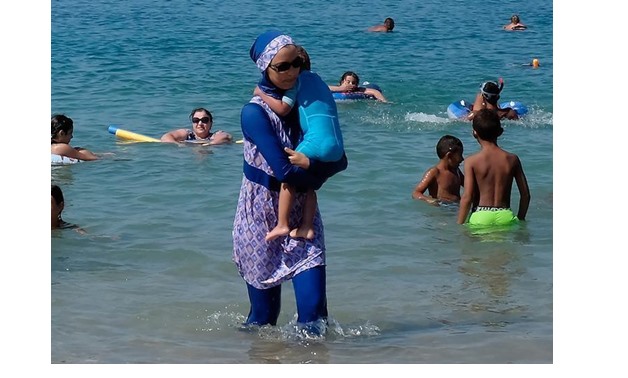
A woman wearing a burkini
CAIRO – 9 August 2017: After only 24 hours of issuing a decision that prohibited hotels and resorts from banning women from wearing “burkinis”, the Ministry of Tourism went back on its decision, citing the need for “further research” about the ban.
On Friday, the Ministry of Tourism had decided that hotels cannot ban women from swimming in burkinis –also known as full-body swimsuits– as long as the swimsuit was “made from the same material as conventional swimwear” and “material that does not react with chlorine in the water.” They also urged hotels with more than one swimming pool to allot one strictly for women.
“It is every citizen’s right to wear whatever they please,” said Mohamed Masoud, a member of the Chamber of Hotel Facilities.
The decision was celebrated on social media. After years of individual women arguing with hotel personnel about their freedom to wear a burkini, there was an official legislation that speaks on their behalf. Their complaints on social media and official complaints to the Ministry of Tourism had been heard.
The celebration was very short-lived.
Ali al-Halawany, head of the Chamber of Red Sea Hotel Facilities, said that hotels were free to decide what can and cannot be worn on their beaches and by their pools, and that the Friday decision should not have been taken anyway, according to Al-Masry Al-Youm.
In Egypt, a predominantly Muslim country, the burkini ban came as quite a shock. The burkini covered the body from head to toe, which allowed hijab-wearing women to swim and became a popular choice among modest non-hijab-wearing women or women who were simply self conscious about wearing a bikini or a traditional swimsuit.
Al-Halwany added that tourism is in a sensitive spot, which might imply that foreigners were bothered by it. Some described the burkini on social media as something that “looks like an alien.”
Manal Rostom, a renowned Egyptian athlete, shared on her Facebook page the story of her last triathlon where she was the only Arab and the only one wearing “surfing tights and tops,” which she jokingly said made her look more like a seal. She described the reception and respect from the other foreign athletes and trainers, and said that she felt as she was being treated like a mermaid.
She even went on several non-Arab talk shows to defend her stance on the burkini, but “to no avail.”
In Rostom’s opinion, the ban was “downright double standards.”
Considering some of the criticism that history-making swimmer Farida Osman received, it was hard not to notice the double standards.
Osman, who competes in a one-piece swimsuit, was criticized online for wearing a tight fitting swimsuit that exposes her legs and arms.
While the burkini debate is not new in Egypt, this week was the first time official measures were taken against it despite them being reversed a day later.
In France, however, authorities had been active. In August of 2016, French police forced a woman to remove her burkini on a public beach, sparking worldwide outrage.
France’s justification, while still annoying and a violation of rights, was understandable.
They wanted to maintain their secularist identity, and the fears of terrorist attacks could create further prejudice.
In Egypt, a country that held their Muslim traditions and ideologies closely, the burkini ban was baffling.

Comments
Leave a Comment